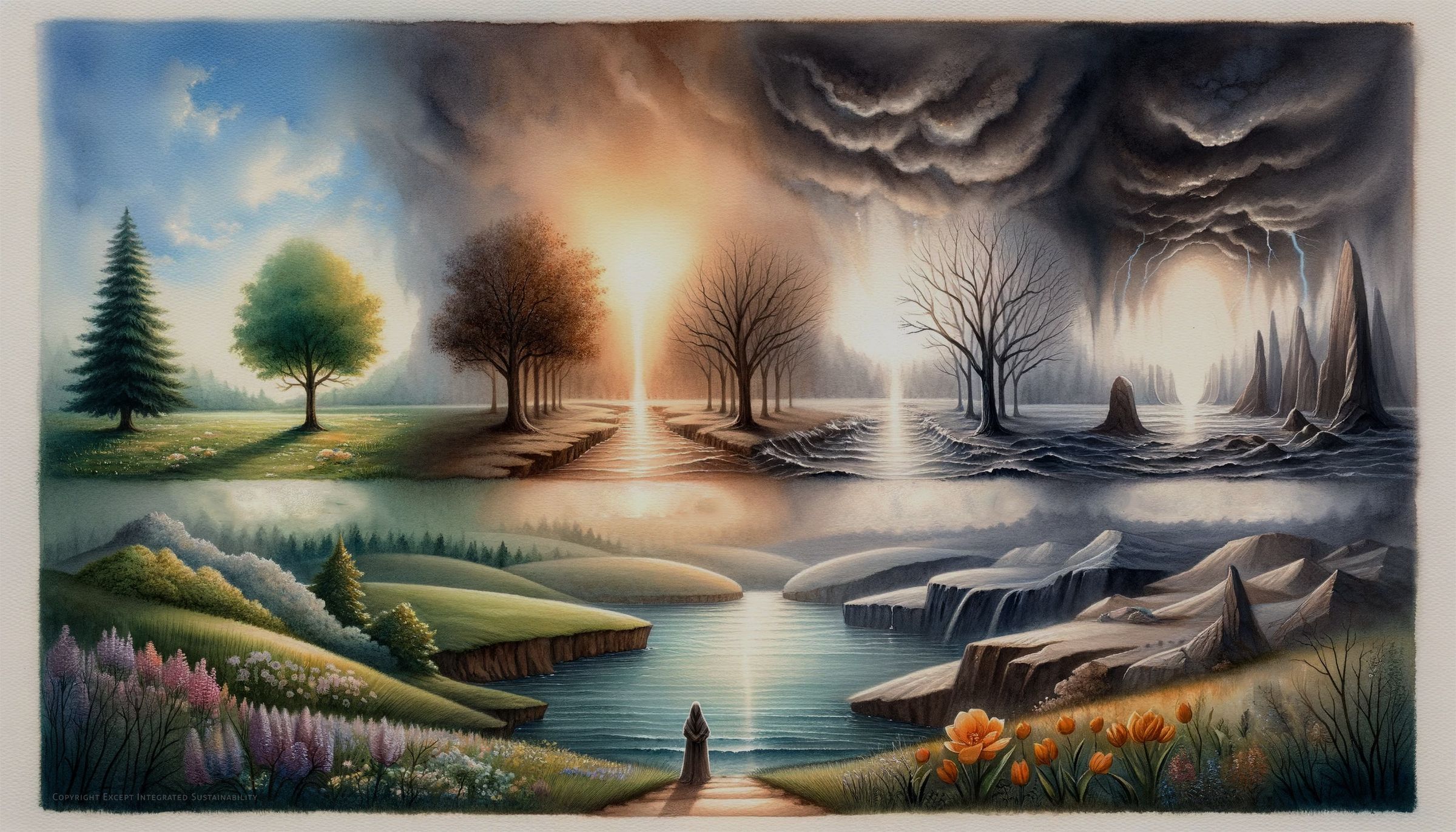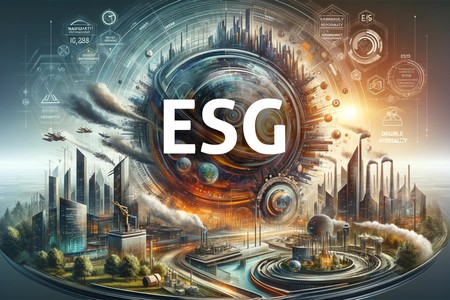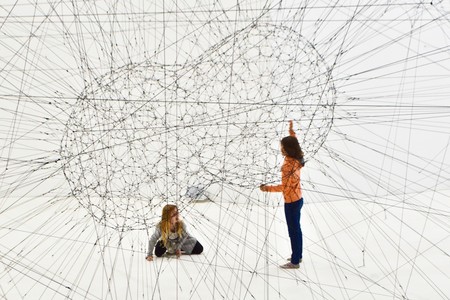Facing the world's crises can feel overwhelming, and understanding our emotional journey through this feeling is key. Join me as I explore how you can build leadership from understanding the stages of grief many of us experience in response to global challenges. Where do we find hope in this darkness? From denial to acceptance, to embracing these emotions as a first step towards hope and constructive action. Let's navigate these turbulent times together, finding resilience and inspiration in our collective journey.
How does leadership arise from crises?
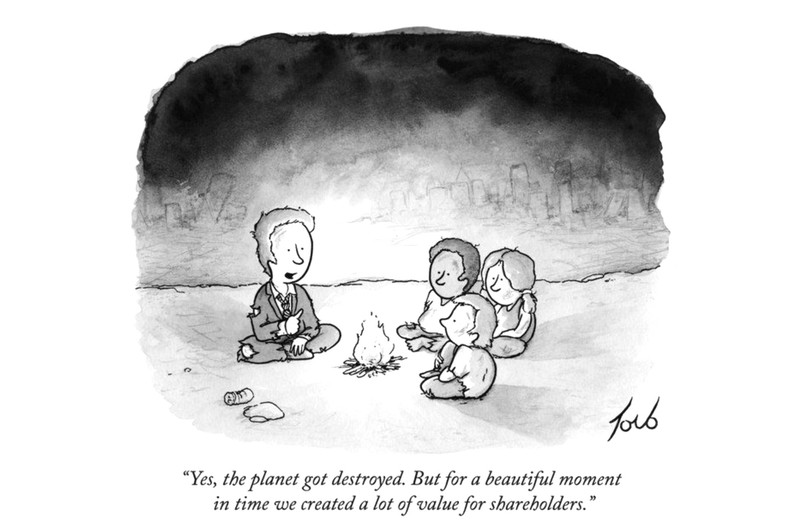
Illustration by Tom Toro
Each day, more people around the world are confronted with the shocking state of our global society. Even among my most optimistic friends, I see moments of despair or depression about the multitude of crises we are facing, in our environment, our economy, society, and others. I started working on systemic sustainability at the end of the 90’s. Back then, I was one of the few worried sick about the coming cataclysms, but in those days I was in the minority. This is no longer the case. Today, a great many people agree that we have very tough challenges ahead, not in the least by the rising international uproar around Cop28, Gaza, Extinction Rebellion, Ukraine, The Small Island States, and other events.
For decades, I have experienced how deeply impactful and unsettling it is to live with the realization of the crises we face. I have emphatically seen this realization arise and cause major shifts in life perspective in a wide range of people. I've seen many of you shuddering with frustration, depression, anger, apathy… these all come along when the understanding of these crises comes ringing the doorbell of the soul. How can we deal with this in a healthy way? How can we constructively go forward, with energy and hope, seeing what we face?
Crisis is inevitable. The systemic patterns were already visible and clear at the end of the 90’s. Conflict is the inevitable outcome of some of the pathways we are on, and accepting this helps to get to the essence of our purpose. But it’s a bitter pill to swallow. As I tell anyone who is eager to hear, the reason why I started to work on systemic sustainability is to prevent large scale human suffering, and widespread war. How to keep hope in light of such realizations? How to remain constructive and retain the energy to fight for a better outcome?
I have written this article over the course of 2023, as a reach-out to everyone who finds themselves confronted with these feelings. For those who wish for hope rather than despair, for constructive pathways rather than depression, without resorting to some dreamy gloss-over of fake hope. To lead in the pivotal year of 2024, I hope this article gives you insight into the stages of our confrontation within ourselves, and helps build a foundation within you for realistic, true hope.
Seeing patterns in our collective crisis-handling
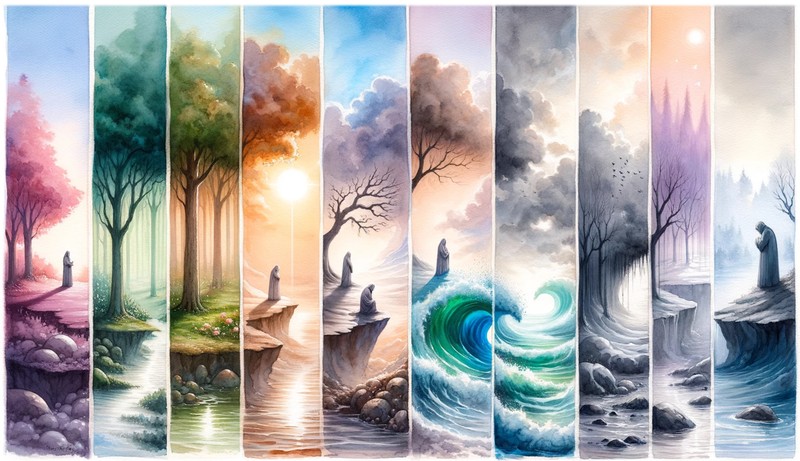
I started working on sustainability when I founded my company Except Integrated Sustainability in 1999. In the two and a half decades since then, I've been fortunate to travel and work in various parts of the world on a wide range of sustainability projects, including the Americas, Asia, the Middle East and Europe. These travels have been the best education I have received, witnessing a diversity of patterns in the real world on how we as people as well as societies handle confrontation with future crises. These range from resource depletion, agricultural challenges, climate adaptation, social upheaval and migration issues, industrial transformation, ecological and urban regeneration. The differences across regions, individuals and organizations have been vast, from the outright denial of problems from C-level executives in some multinationals, to deep existential despair from eco-warriors seeing their habitats obliterated in front of them. But also the other way around, the passionate business executive working to safeguard the future of their grandchildren, and the careless native helping to deforest swathes of land to fill their own pockets.
In these years, I've seen the myriad of ways in which we, as a society, respond to increasingly complex challenges. The good, the bad, and the ugly. As the awareness of global crises becomes more common as well as more pressing, I see individuals fulfill various roles in the transition, and respond with complex emotions that govern our behavior. Some of these are useful, others not so much. In these responses, I've observed a pattern, one that closely mirrors the five stages of grief. You may remember these stages, from psychology, as the stages that most people go through when dealing with immense grief, such as the loss of a loved one. They were introduced by Swiss-American psychiatrist Elisabeth Kübler-Ross in her 1969 book “On Death and Dying”. The five stages Elisabeth described are denial, anger, bargaining, depression and acceptance. These stages are a journey from the initial confrontation with an emotional shock, to the eventual acceptance of its reality.
Understanding and reflecting on this journey of acceptance, I've found, helps to transcend grief about the direction we are heading in, as well as enabling us to support others to do so as well. In acceptance lies hope, and the seeds for a constructive path forward. I myself have seen this path within myself, with years spent in each of these stages, and to be honest, still regressing into them at times, when my energies have depleted, and it’s hard to see the light. Yet, knowing about them, and the constructive and powerful hope and energy that lie at the end of them never fails to fish me out of the hole.
None of this is really new, it is only new to many people in our generations. I remember a conversation with my grandmother, who lived through the Second World War. She spoke of the initial disbelief, the anger, the desperate hopes, and eventually, the acceptance of the reality of war. Her stories, though personal, resonated with me as a universal truth. Whether it's the threat of war, the challenges of climate change, looming resource shortages, the growing migration tragedies, our collective response often follows a seemingly predictable trajectory. We see it manifested all around us, from politics to online discussions, to the chat at the coffee machine in the office.
But why talk about grief when discussing global crises? Because, in many ways, we are mourning. Mourning the loss of a world we once knew, the loss of innocence, perhaps the demise of dreams we held from childhood, and for many, the loss of a future we once envisioned. Yet, as I've learned from my travels, from my work, and from the stories of those I've met, acceptance is not the end. It's the beginning. It's the starting point of resilience, of innovation, and of hope.
Understanding these stages of grief in our dealings with the crises that lie before us can help us in managing ourselves, our emotions and wellbeing, as well as the understanding of many others that are with us on the same journey. All this begins with the first, and most crippling of stages of crisis grief: denying there is a problem in the first place.
Phase 1. Denial: Dismissing the Imminent Threat
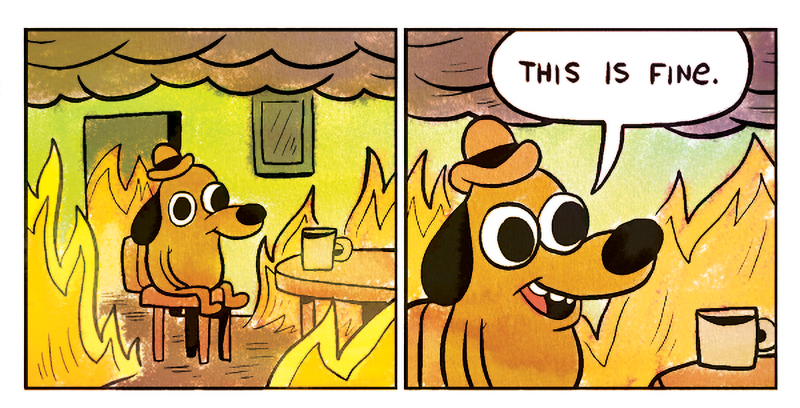
Illustration: KC Green, “On Fire”
Growing up in the Netherlands, I was surrounded by tales of the country’s resilience against water. The intricate canal systems, the dikes, and the windmills are not just tourist attractions; they are symbols of our defiance against nature's wrath. But as I delved deeper into sustainability, I realized that this defiance was, in many ways, a form of denial. We believed (and most still do) that we can engineer our way out of any problem, that our technological prowess will always come to our rescue.
I recall a summer evening, sitting by the canal with a group of friends. The conversation drifted to rising sea levels and the potential threat to our beloved city. Most dismissed it as a distant concern, something that future generations might have to deal with. "The Netherlands has always faced water challenges," one friend remarked, "and we've always found a way." This sentiment, though comforting, is a classic example of denial. It's the belief that the problem isn't as bad as it seems or that it won't affect us personally.
As I have learned, the ‘water managers’ of the Netherlands are in despair. There is no way we can win and keep all of the country dry with the imminent rise of sea water levels and changes in river tides. This uncomfortable truth is not spoken out loud often in the media, but the experts know: we’ll have to give parts of the country back to the sea. Yet, many, and not least of all many in the country’s politics, are still in denial about this.
In my travels, I've seen this denial manifest in various forms. In the sprawling metropolises of Asia, where rapid urbanization often outpaces infrastructure development, there's a belief that growth will solve all problems. In the vast deserts of the Middle East, where water scarcity is a pressing concern, massive desalination projects are hailed as the ultimate solution, as a tech-bandaid. Around the world people look at vertical farming or things like hydroponics, and believe this will be the solution to our global agricultural crisis. But beneath these ambitious endeavors lies a reluctance to face the root causes of our challenges.
Denial, as I've come to understand, is not just about dismissing a problem. It's about seeking comfort in familiar narratives, in stories of past triumphs. It's about holding onto a vision of the world that aligns with our desires and beliefs. But as history has shown, denial can be costly. It can delay necessary action and exacerbate challenges.
The Illusion of Technological Salvation
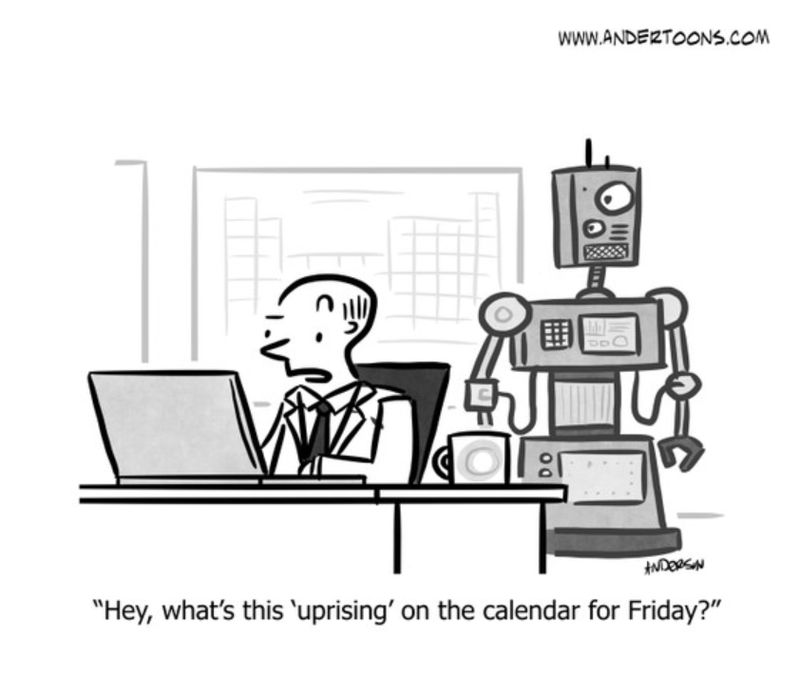
Illustration by AnderToons
In my early days as an urban planner, I was often enamored by the allure of technology. The idea that we could design smarter cities, harness renewable energy, and even geoengineer our way out of climate change was tantalizing. I remember attending a conference in New Haven at Yale University where a renowned scientist spoke of a future where carbon-capturing machines would cleanse our atmosphere, and renewables would power our world. The room was filled with hope and anticipation.
But as the years rolled on, and as I delved deeper into the intricacies of sustainability, I realized that this technological utopianism was, in many ways, a form of escapism. It's a comforting narrative, one that assures us that innovation will come to our rescue, that we can continue our current lifestyles without significant change. But is this really the case?
According to a piece on Medium by Eszter Brhlik, technological promises have delayed climate action for the last 40 years. The latest IPCC report paints a grim picture, with countless impacts of climate change already being irreversible. The belief that new technologies such as nuclear fusion or carbon capture will 'save' us from climate change is not just optimistic; it's potentially counterproductive. As Brhlik aptly puts it, "A better world is not coming. We have to create it. And we better do it fast."
This sentiment is echoed by other researchers and experts. A Harvard Business Review article points out that innovation takes time, often more time than we have. Another study from Lancaster University warns that an overreliance on promises of new technology to solve climate change is enabling delay.
I've seen this technological optimism firsthand. In my discussions with policymakers and industry leaders, there's often a sense of complacency, a belief that the next big breakthrough is just around the corner. But as I've learned from my travels, from my work, and from the stories of those I've met, we cannot afford to wait. We cannot pin our hopes on a technological silver bullet. We need a holistic approach, one that combines innovation with behavioral change, policy reforms, and grassroots action.
I often think back to that evening by the canal. The laughter, the camaraderie, the gentle ripples of water reflecting the city lights. It was a moment of blissful ignorance, a snapshot of a world before the storm. But as the years rolled on, and as the realities of climate change became more evident, that moment served as a poignant reminder. A reminder that denial is but the first step in a long journey of acceptance.
Phase 2. Anger: pointing fingers and seeking blame

“How dare you?” - Greta Thunberg demands change and calls out world leaders on UN Climate Summit in 2019.
In the vast tapestry of human emotion, anger stands out as one of the most potent and visceral. It's a force that can drive us to action, but it can also blind us to reason. As we navigate the stages of crisis acceptance, anger is an inevitable stop on this tumultuous journey. And believe me, I've been there. I’m still there frequently enough.
I remember a time when I was working on a project in Southeast Asia, in the Philippines. The sheer scale of urbanization and industrialization was staggering. Thousands of acres of agricultural land were being transformed into sprawling urban landscapes and industrial zones. As I was asked to review the plans, I saw it did not account for any social or environmental impacts in any significant way. A gated community for the well to do with a retail mall, with some solar panels and EV charge points slapped on for green brownie points, while tens of thousands of people right next door lacked access to drinking water. While the community celebrated this project as progress, I couldn't help but feel a deep-seated anger. Why? Because these developments, though modern in appearance, were rooted in outdated perspectives. They are dishonest, unethical, and leave scars in the urban fabric for centuries. They are not only narcissistic in nature, they steal opportunity. It would have been so easy to use this giant infrastructure project to also help upgrade the community around it. It was all about consumption and exclusive wealth, not sustainability.
It's easy to get angry when you see the world making the same mistakes over and over again. Like when I studied the failure of Masdar City, the supposed "sustainable city" in the desert. Billions were invested, yet it was declared a failure within a decade. And then there's NEOM’s ‘The line’ city being built today, which seems to be treading a similar path. It's like watching a car crash in slow motion, and you're yelling, "Stop!" but no one's listening.
But here's the thing about anger: it's a double-edged sword. On one hand, it can be a catalyst for change. It can push us to challenge the status quo and demand better. But on the other hand, if left unchecked, it can consume us. It can make us bitter, resentful, and closed off to potential solutions.
I've been through that phase of anger, especially when I think about the resource wars and the geopolitical tensions rooted in resource scarcity. Ukraine, Taiwan, the trade routes – all these conflict zones have resource undertones. It's infuriating to think that we're still fighting over resources in the 21st century. But then I remind myself of something crucial: anger, in itself, won't solve anything. It's what we do with that anger that counts.
In my travels and work, I've met countless individuals who channel their anger into positive action. They're the innovators, policymakers, and entrepreneurs who are tirelessly working to reshape our societies. They're the ones who see the failures of the past and are determined not to repeat them. They're the ones who understand that the future isn't set in stone – it's something we craft today.
So, how do we navigate this anger? First, we need to acknowledge it. It's okay to be angry about the state of our world. It's okay to be frustrated with the pace of change. But then, we need to channel that anger. We need to use it as fuel to drive us forward, to innovate, to challenge, and to build.
In my own life, I've found solace in the small victories. Every sustainable project I work on, every company, industry, or city that adopts a more holistic approach, every individual who chooses to live more sustainably – these are the wins that keep me going. They remind me that change is possible, even in the face of overwhelming odds.
In conclusion, anger is a natural part of the journey towards crisis acceptance. But it's essential to remember that it's just one stop on this journey. Beyond anger lies acceptance, understanding, and the potential for transformative change. That's where I choose to focus my energy. Because in the end, it's not about how angry we are, but about what we do with that anger that will define our future.
Phase 3: Bargaining
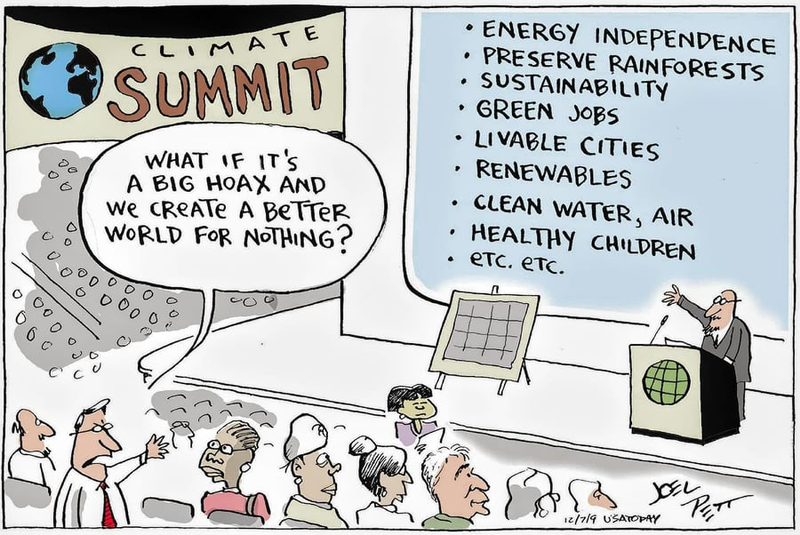
Illustration © 2014 CartoonArts International
Bargaining is a curious stage. It's that desperate attempt to negotiate with the universe, to find a middle ground, a compromise. It's the "if only" and "what if" that keeps us up at night. In the context of our current global crises, bargaining takes on a whole new dimension.
I remember a time when I was in Vietnam, working on a project for sustainable urban development. One evening, after a long day of meetings, I found myself at a local café, sipping a cooling ice tea. As I looked out onto the bustling streets, I overheard a conversation between two young locals. They were discussing the rapid industrialization of their country and the environmental consequences that came with it. One of them said, "If only we could keep our traditions and still progress without harming the environment." It struck me then – this was bargaining in its purest form.
Throughout my travels and interactions, I've seen this sentiment echoed in various forms. From the farmer in the Philippines worried about changing weather patterns, bargaining for just one more season of predictable rains, to the urban planner in Amsterdam, hoping that some tweaks in city design might stave off the inevitable consequences of rising sea levels.
But here's the thing about bargaining – it's a double-edged sword. On one hand, it can lead to innovation and solutions. It pushes us to think outside the box, to find that middle ground where both humanity and nature can coexist. On the other hand, it can also be a form of denial, a way to delay the inevitable, to avoid facing the hard truths.
In my work, I've seen both sides of this coin. I've witnessed projects that were born out of a genuine desire to find sustainable solutions, like the attempts to create carbon-neutral cities, that use bargaining as a way to gain acceptance from all stakeholders. But I've also seen projects that, through bargaining, became merely a façade, a way to appease the growing concerns without making any real changes, like ESG schemes, or blatantly corrupt carbon sequestration schemes (looking at you, Verra). I've also seen 'bargaining' result in transitioning a project with a truly impactful goal, to a textbook case of greenwashing.
Take, for instance, the case of Masdar City. It was a grand vision, a city that would be entirely carbon neutral, a beacon of sustainability in the desert of Abu Dhabi. But as time went on, it became clear that the project was falling short of its lofty goals. It didn't have a holistic approach, and it was all designed with a 'technology will save us' mindset, trying to bargain away the complexities of sustainable design. Yet, instead of re-evaluating and adjusting, there was a sense of clinging on, of trying to find ways to make it work without addressing the fundamental issues. Of course, it still failed, and the city is threatened to be the first “eco-ghost town” as the Guardian reports, and its carbon-neutrality goal has been officially abandoned. This, to me, is the danger of bargaining. It can blind us to the realities, making us grasp at straws instead of seeking real solutions.
But it's not all doom and gloom. Bargaining can also be a catalyst for change. When channeled correctly, it can lead to breakthroughs. I've been fortunate to work with some brilliant minds in the field, individuals who have taken the essence of bargaining and turned it into innovation. They've looked at the challenges we face and asked, "How can we do this differently? How can we find a balance?", and even better "What mindset are the stakeholders in? How can we appeal to them to choose in favor of their own long term benefit?".
In my own life, I've had my moments of bargaining. I've wondered if there's a way to preserve the things I love – like my passion for cars – while still moving towards a more sustainable future. And through these moments of introspection, I've realized that it's not about giving up what we love, but about reimagining it. Maybe the cars of the future are only used sparingly, like how the use of horses transitioned from essential infrastructure to mostly a hobby. That reimagining can also be a useful way of using bargaining.
In conclusion, as we navigate the stages of crisis acceptance, it's essential to recognize bargaining for what it is – a natural human response. But it's also crucial to ensure that it doesn't become a hindrance or distraction. Instead, let's use it as a stepping stone, a way to propel us forward into a future where both humanity and nature thrive.
Phase 4: Depression

Image adapted from the Simpsons
The weight of the world's crises can be overwhelming. It's a burden that, at times, feels too heavy to bear. In the face of such monumental challenges, it's only natural to feel a sense of despair. Depression, in the context of crisis acceptance, is not just about feeling downcast. It's about confronting the hard truths, acknowledging the gaps in our understanding, and realizing the magnitude of the task ahead. It's about feeling the weight of responsibility and the urgency to act.
Stepping over the depression stage too lightly may get you stuck in it. It is hard to imagine anyone reading a newspaper today and not feeling an underlying anxiety about the future. The looming resource shortages, the environmental degradation, and the social inequalities are all too evident. What are we to do?
Depression is often ignored. Few people are okay with being the depressed one at the table. We wear a mask to cover our deep seated sadness in order to carry on and not ruin anyone’s party. As long as others still believe we can get ourselves out of this pickle, it is maybe ok? What use is talking about it, anyway? We get goaded into having to be positive all the time. Sad stories don't work as well as positive ones, we're told. Well, I'd rather have a true sad story than a fake hope story any day.
A decade ago, I stood before my colleagues at Except's 15th anniversary, reflecting on our journey. I spoke of vulnerability, of the challenges we faced, and the lessons we learned. But more than that, I spoke of my personal struggles. I shared my journey from a troubled childhood, locked in a situation I had no control over, to finding my purpose in sustainability. I spoke of the times when the weight of our mission felt too heavy, when the challenges seemed insurmountable, and when the path ahead was unclear.
I remember the nights when I questioned our efforts, when I wondered if we were making a difference. The projects that failed, the initiatives that didn't take off, and the countless hurdles we faced. But through it all, there was one constant – vulnerability. It was the willingness to open up, to share our dreams and fears, and to connect with others on a deeper level. It was the realization that to truly make a difference, we had to be vulnerable. We had to expose our innermost thoughts and feelings, to put ourselves out there, and to take risks.
Depression, in many ways, is a manifestation of this vulnerability. It's the realization that the world's problems are vast and complex, and that our efforts, no matter how noble, might not be enough. But it's also a call to action. It's a reminder that we should not concern ourselves with moving the deck chairs on the Titanic. We have the power to make a difference, our actions can have a ripple effect. But only if we focus on the right things.
In my personal journey, I've learned that depression is not a sign of weakness. It's a sign of depth, of introspection, and of a deep understanding of the world's challenges. It's a stage where we confront reality, but also discover the potential for change. It's a stage where we realize that while the challenges are immense, so are the opportunities. If we can find ways to express our depression, and connect with others, we find easier ways to deal with it. Often only by talking about it, voicing our concerns, are we able to release ourselves. We may find more compatriots than we thought in the process.
So, as we navigate the stage of depression, let's not lose sight of the bigger picture. Let's remember the countless lives we've touched, the projects we've undertaken, and the change we've been a part of. Let's remember the times when we felt vulnerable, when we opened up and connected with others, and when we discovered the true meaning of sustainability.
In the end, depression is not just a stage of grief; it's a call to action. It's a reminder that while the journey ahead is daunting, we have the tools, the knowledge, and the collective will to forge a better path. And as we move forward, we do so with a deeper understanding, a renewed commitment, new partnerships based on core values, and an unwavering belief in the power of human ingenuity and collaboration.
Phase 5: Acceptance

In the journey of navigating crises, acceptance is the final and perhaps the most transformative stage. It's the point where we recognize the reality of our situation and begin to take proactive steps towards a better future. Drawing from my personal experiences and the many conversations I've had over the years, I've come to realize that acceptance is not just about acknowledging the problem but also about envisioning a sustainable solution.
"You know, after these 10 years I’ve been working in sustainability, this is the first time that I'm feeling hope, because this is real, this can really happen. This is not a pie in the sky thing, this is serious." a German scientist once told me after a deep dive into the framework of Orchid City, the self sustaining city model we've been working on for a while. This sentiment, of wanting to build hope on realistic terms, resonates with many who have been on the front lines of sustainability. The feeling of hope is not just about optimism; it's about seeing tangible, realistic solutions that can be implemented.
Orchid City, for instance, is not just a dream. It's a manifestation of systems thinking, a culmination of years of research, experimentation, and collaboration. It's a city model that is self-sustaining, climate adaptive, socially just, and generation-proof. More importantly, it's affordable. It's a city where every family can live comfortably, have access to essential resources, and enjoy a quality life. Knowing that we can actually build this today, realistically, it's a source of true hope for me.
But why is acceptance so crucial in this context? Because without it, we remain stuck in the previous stages of denial, anger, bargaining, and depression. We continue to say “Oh, can’t we get there with this technological innovation?” or, some other distraction. We continue to resist change, hold onto outdated systems, and fail to see the opportunities that lie ahead. Acceptance allows us to break free from these constraints and embrace a new way of thinking and living. Just as I started Orchid City after a few years of prolonged depression, only then I found myself able to get up and start working on something real.
In my journey, I've learned that acceptance is not a passive act. It's a proactive stance towards creating a better future. It's about embracing the complexities of our world, recognizing the interconnectedness of all things, and taking meaningful steps towards sustainability. The challenges we face today, from climate change to social inequalities, are complex. They cannot be solved with linear thinking or isolated solutions. We need a holistic approach, one that takes into account the intricate web of relationships that define our world. This is where systems thinking comes into play.
Systems thinking is not just a theoretical concept; it's a practical tool that can help us navigate the complexities of our world. It allows us to see the bigger picture, understand the underlying patterns, and design solutions that are sustainable and resilient. From the insights gained, we can find true, meaningful hope, and through this accept our journey.
As we move forward, I urge everyone to embrace this kind of acceptance. Let's accept the reality of our situation, but let's also accept the responsibility to create a better future, properly. Acceptance is the first step towards meaningful change. We must accept that our current trajectory is unsustainable. We must accept that change is necessary. And most importantly, we must accept that we have the power to make a difference.
From Acceptance to Hope

In the vast tapestry of life, acceptance is the thread that binds us to reality. It's the realization that, while we might not have control over every situation, we can control our reactions and the steps we take next. Acceptance isn't about giving up; it's about understanding the present and preparing for the future.
I remember my younger days, growing up partially in a foster home, facing challenges that forced me to mature quickly. Those experiences taught me the value of resilience and the importance of accepting reality, no matter how harsh. It's a lesson I've carried with me throughout my life, and it's become a cornerstone of my approach to sustainability.
I don't think hope is useful when it is attached to something that isn't realistic; that's fantasy. True hope comes from things that you know will work and can be done. Navigating the labyrinth of global crises, from climate change to resource shortages, is akin to traversing the emotional spectrum of grief. As I've shared throughout this discourse, my personal journey has often mirrored these stages, from the raw denial of my younger days to the acceptance and proactive approach I champion now.
The five stages of grief, as we've explored, are not just a personal emotional journey but also a reflection of society's collective response to the looming environmental and societal challenges. Denial, anger, bargaining, depression, and acceptance are not linear stages but cyclical, with society oscillating between them as new challenges arise and old ones resurface. So too, they are cyclical within ourselves.
Even today, I find myself ensnared by these stages at unexpected moments. There are days when I wake up angry, frustrated at the slow pace of change or the resistance from certain quarters. I recall a recent meeting with city planners where I found myself bargaining, trying to compromise on some sustainability aspects of a project, hoping it would make it more palatable to stakeholders. And yes, there are moments of denial, fleeting instances where I wish away the looming challenges, hoping they're not as dire as they seem.
But with time and experience, I've learned the value of rising above these emotions. It's about seeing them in context, understanding their origins, and allowing them to exist without being consumed by them. These emotions, as raw and challenging as they might be, offer a deeper understanding of all the stakeholders involved in societal transformation. They provide insights into their fears, hopes, and motivations, allowing for more empathetic and effective collaboration.
Conclusion: from hope to leadership
In navigating the tumultuous journey through the stages of grief in response to our global crises, we arrive at a crucial juncture. It is not merely about acceptance but about transformation. This journey, marked by denial, anger, bargaining, and depression, culminates in a powerful realization: our collective resilience and capacity for innovation.
As we stand at this crossroads, we must recognize that the path forward is not paved with passive hope or blind optimism. Instead, it requires a conscious, collective effort to reimagine and rebuild. We are tasked with crafting a future that harmonizes with our planet's limits and respects the intricate web of life that sustains us.
Let us embrace this challenge with the knowledge that every small step counts. Each sustainable project we undertake, every policy we reform, and every individual action towards a more sustainable lifestyle contributes to a larger, transformative wave. This is our moment to turn grief into a driving force for hope and action.
In conclusion, our journey through these stages is more than a path to acceptance; it's a call to arms. A call to each of us, as individuals and as a global community, to rise, innovate, and act. Together, we can forge a future that is not just sustainable, but also thriving and equitable. The time to act is now, and the responsibility lies with each of us. Let's move forward with purpose, courage, and a steadfast commitment to the world we envision.
In closing, I'd like to express my gratitude to everyone who's been a part of this journey. Whether you're a fellow sustainability innovator, a concerned citizen, or someone just starting to explore the world of sustainability, your passion and commitment give me hope. Together, we can create a brighter, more sustainable future. Have a great 2024!
Discuss with us
Talk about this article with us and others here on LinkedIn.
Dec. 31, 2023
